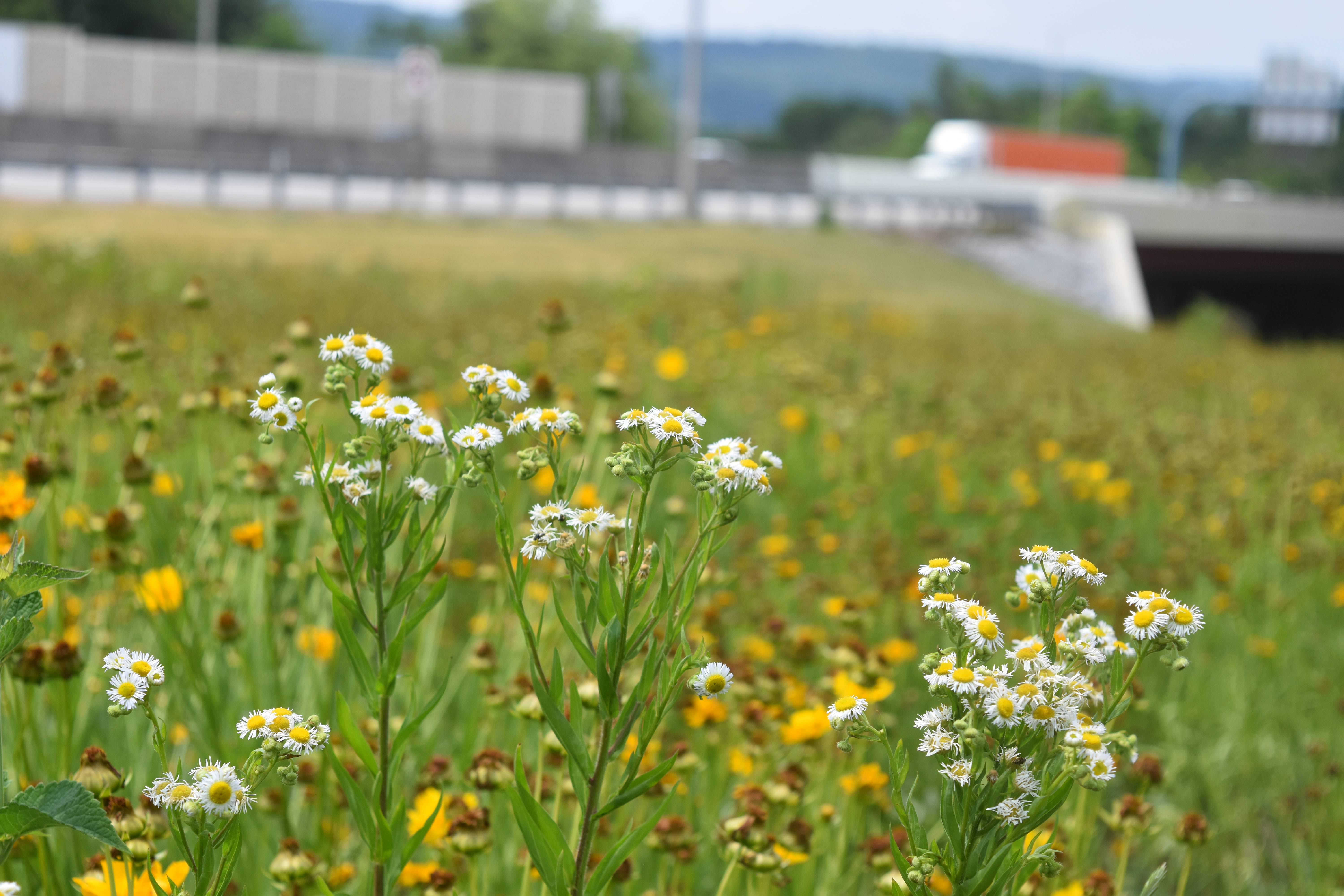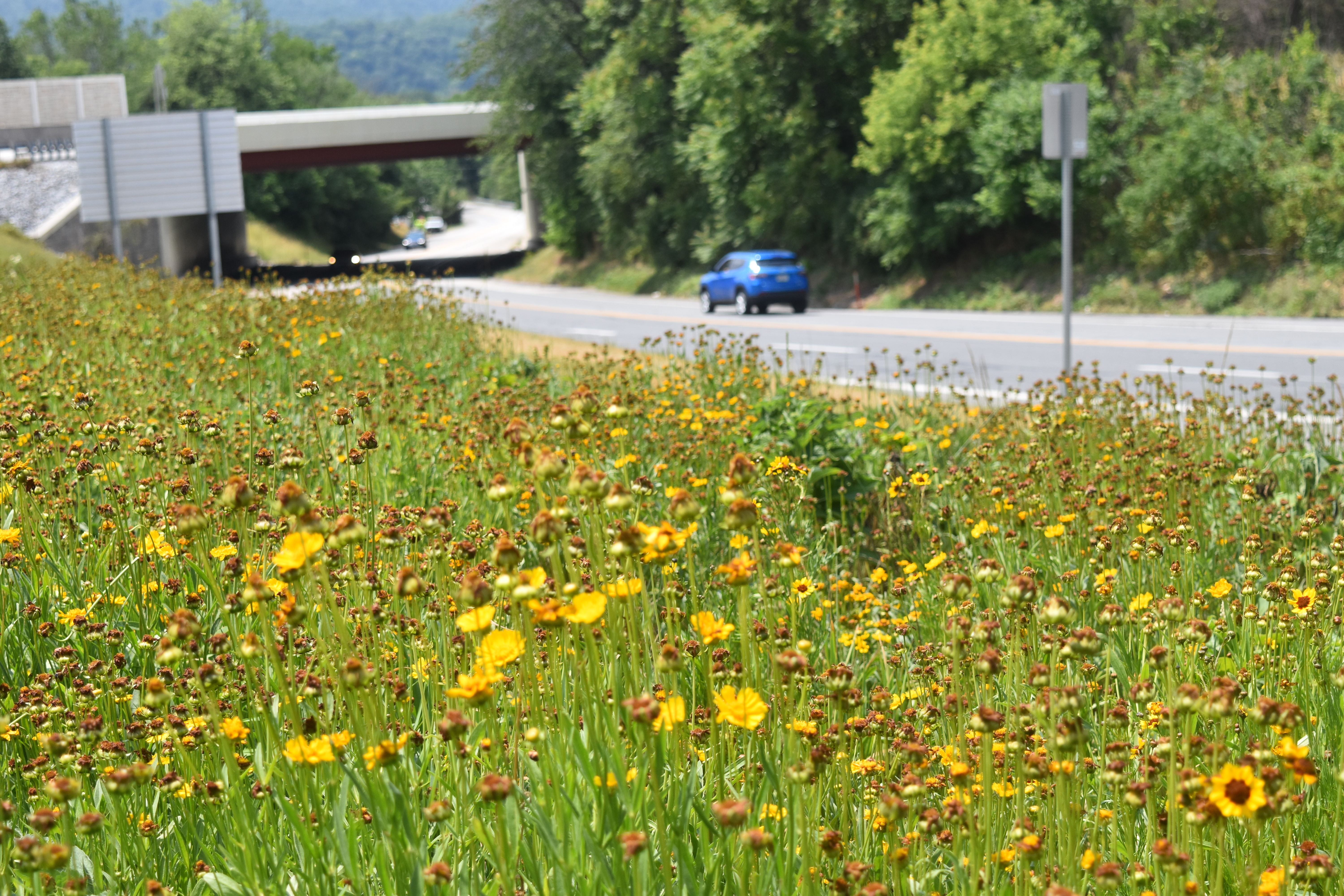We're recognizing National Pollinator Week with updates on pollinator plantings around the state.
Roadside pollinator plantings, led by PennDOT, PA Turnpike and other partner organizations are taking place around Pennsylvania. PennDOT has overseen more than 40 acres of pilot pollinator plantings with an additional 25 acres of habitat in progress. Areas targeted for pollinator-specific plantings are continually monitored by maintenance teams for the presence of invasive species and weeds as well as healthy growth and pollinator activity.
In addition to plantings, PennDOT seed mixture updates took effect earlier this year. Seed mix updates removed notable non-native and invasive plants and added pollinator-friendly plants such as black-eyed susans (Rudbeckia hirta), ox-eye sunflowers (Heliopsis helianthoides) and common milkweed (Asclepias syriaca).
"The degradation and loss of pollinator habitats is a risk to those affected species as well as pollinator dependent crops across the state," said PennDOT Executive Deputy Secretary Cheryl Moon-Sirianni. "We invite every Pennsylvanian to join us in their own gardens, or with PennDOT through the Adopt and Beautify program."
The PA Turnpike has piloted five pollinator habitats across the state. Within those locations there are 19 different plots for a total of over 10 acres which utilize a variety of seed mixes and management practices. These plots include many of PennDOT's seed mixes of 16 different native plants. The seeds include an array of native wildflowers like lanceleaf coreopsis (Coreopsis lanceolata), mint plants like anise hyssop (Agastache foeniculum), herbaceous perennials like milkweed species (Asclepias sp.) and wild bergamot (Monarda fistulosa), as well as the flowering plant foxglove beardtongue (Penstemon digitalis).
At the PTC administration building in Dauphin County, the turnpike has overseen the planting and maintenance of this pilot site, with Lance-leaved coreopsis currently blooming.


"Pollinator habitats provide an array of colors and fragrance," said PA Turnpike CEO Mark Compton. "But more importantly these natural gardens, comprised of native plants, promote, protect and preserve pollinating animals."
PennDOT's Pollinator Habitat Plan, adopted in 2019, is operated in partnership with other federal and state agencies, private and community organizations, to create naturalized gardens and meadows planted with pollinator-friendly plant species at designated sites. Highway rights-of-way have been recognized nationally as lands that have potential to provide habitats for pollinators and support corridor connectivity for pollinators.
In November 2022, Act 112 established the Pollinator Habitat Program Fund to be supported in-part by purchases of the new Pollinator license plate PennDOT announced earlier this year. The fund will create naturalized gardens and meadows planted with pollinator-friendly species of flowering plants specifically for bees, butterflies, beetles, and other insects which may have been adversely affected by the loss of their native habitat. Sixty-five percent of the proceeds from the license plate will be deposited into the Pollinator Habitat Program Fund.
The Pollinator license plate is now available for passenger cars or trucks with a registered gross weight of not more than 14,000 pounds. Applicants for the Pollinator license plate must submit a completed Form MV-911, "Application for Special Fund Registration Plate." More information, including eligibility requirements and image of license plates, is available on the Registration Plates page on PennDOT's Driver and Vehicle Services website.
National Pollinator Week is recognized internationally during the last full week in June as an opportunity to spread awareness about the importance of pollinator species to the eco-system and promote native pollinator gardens.
Habitat loss, fragmentation and degradation, increased pesticide use and introduced diseases are threatening pollinators around the world. Native pollinator-positive plants are a critical link in Pennsylvania’s eco-system providing habitat for pollinators like butterflies, bees and hummingbirds to support crops and local biodiversity.